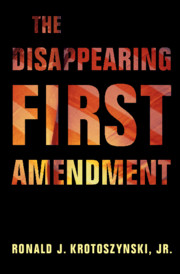Book contents
- The Disappearing First Amendment
- The Disappearing First Amendment
- Copyright page
- Dedication
- Contents
- Preface
- Acknowledgments
- Table of Cases
- 1 Two Steps Forward, One Step Back
- 2 The Public Forum Doctrine and Reduced Access to Government Property for Speech Activity
- 3 The First Amendment As a Source of Positive Rights
- 4 Whistleblowing Speech and Democratic Accountability
- 5 Shedding Their Constitutional Rights at the Schoolhouse Gate
- 6 Transborder Speech
- 7 Systemic Failures to Protect Newsgathering Activities by Professional Journalists and Amateur Citizen-Journalists Alike
- 8 The Citizen As Government Sock Puppet and the State Masquerading As a Citizen
- 9 Using Constitutionally Permissible Statutes to Impede First Amendment Activity
- 10 Conclusion
- Notes
- Index
8 - The Citizen As Government Sock Puppet and the State Masquerading As a Citizen
The Problem of Coerced and Misattributed Speech
Published online by Cambridge University Press: 02 August 2019
- The Disappearing First Amendment
- The Disappearing First Amendment
- Copyright page
- Dedication
- Contents
- Preface
- Acknowledgments
- Table of Cases
- 1 Two Steps Forward, One Step Back
- 2 The Public Forum Doctrine and Reduced Access to Government Property for Speech Activity
- 3 The First Amendment As a Source of Positive Rights
- 4 Whistleblowing Speech and Democratic Accountability
- 5 Shedding Their Constitutional Rights at the Schoolhouse Gate
- 6 Transborder Speech
- 7 Systemic Failures to Protect Newsgathering Activities by Professional Journalists and Amateur Citizen-Journalists Alike
- 8 The Citizen As Government Sock Puppet and the State Masquerading As a Citizen
- 9 Using Constitutionally Permissible Statutes to Impede First Amendment Activity
- 10 Conclusion
- Notes
- Index
Summary
Increasingly, some state governments have used their ability to regulate the professions in order to compel professional speech (arguably false and misleading professional speech), while other state governments have regulated professional speech to force licensed professionals into involuntary silence (even when standards of professional ethics would require a licensed professional to speak).1 For example, South Dakota and Texas have required medical service providers to provide medically unnecessary information and also to provide information that most physicians believe to be medically false.2 Other states, like Florida, have prohibited medical professionals from engaging in speech related to topics, such as gun ownership, that the state would prefer them to avoid.3
Professor Tim Zick observes that “[a] new generation of professional speech regulations is placing considerable pressure on doctrinal, theoretical, and professional boundaries.”4 Using the “cellophane wrapper” of professional regulation,5 government seeks to use private citizens to deliver ideologically-charged messages of its choosing. If the government itself wishes to enter the marketplace of ideas in order to disseminate particular messages about the dangers of abortion or the wonders of gun ownership, no significant First Amendment impediments would exist.
- Type
- Chapter
- Information
- The Disappearing First Amendment , pp. 176 - 193Publisher: Cambridge University PressPrint publication year: 2019



